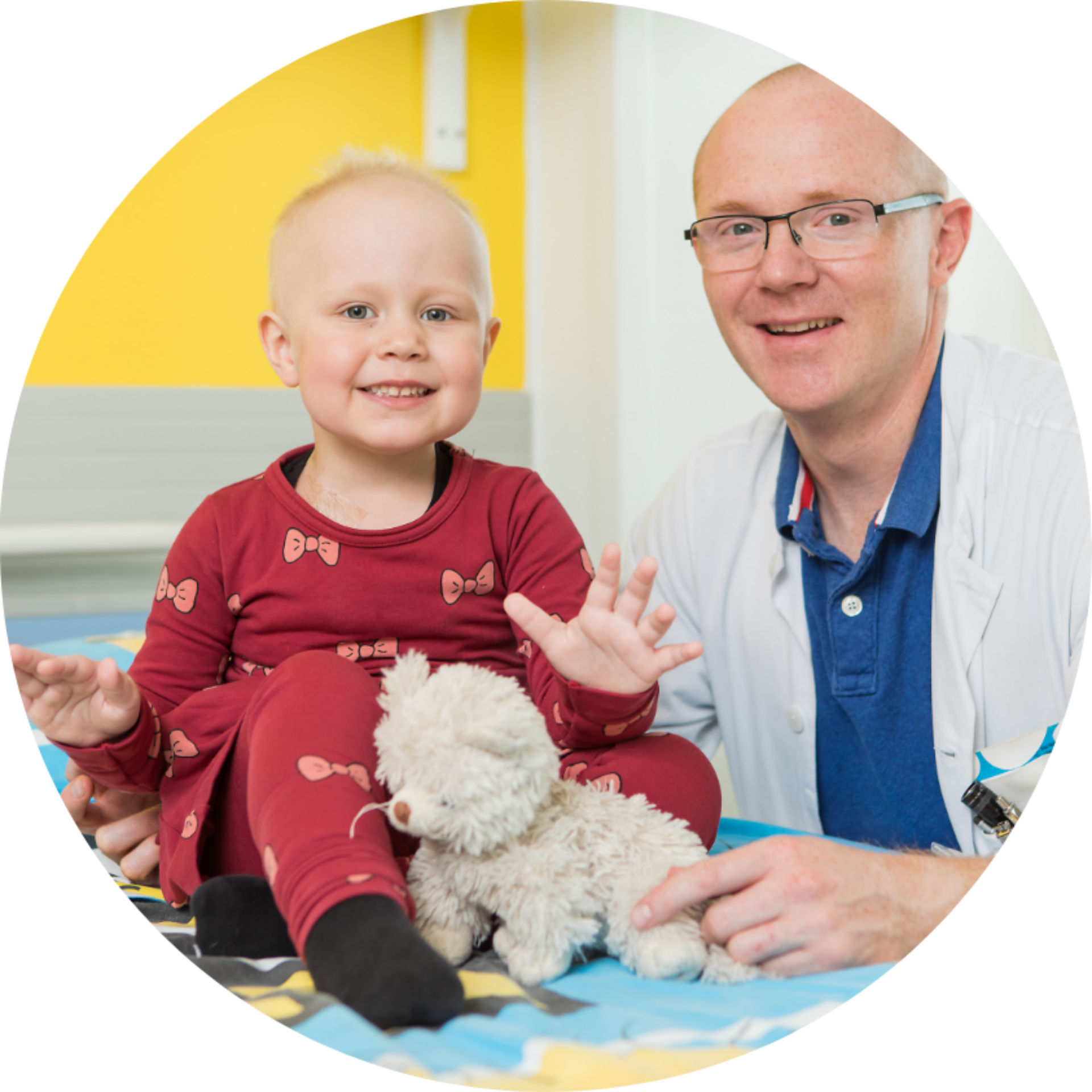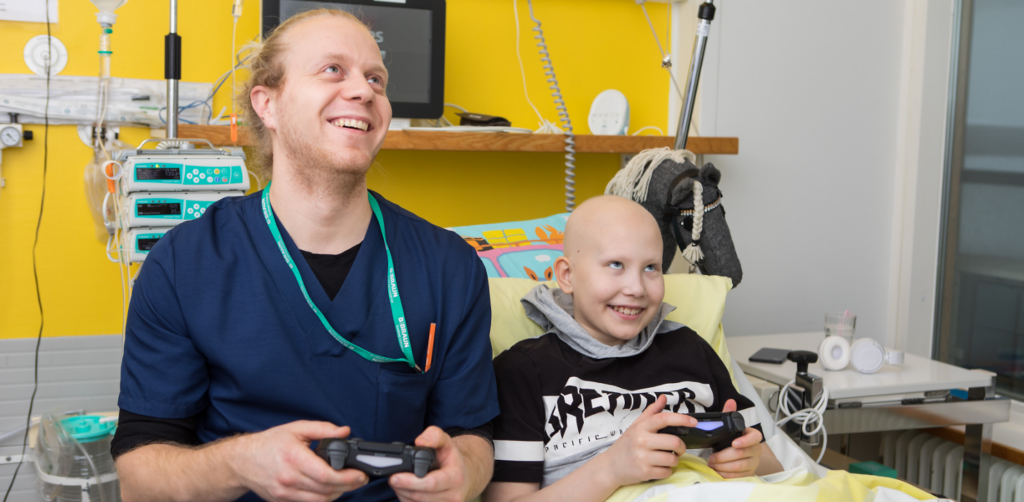
The treatment of childhood cancers in Tampere is world-class
The treatment of paediatric cancers at Tampere University Hospital, Tays Cancer Centre, is at an international top level. However, this has not happened by itself, and the development of high-quality treatment and new forms of treatment relies on constantly advancing research. The research also produces new information for education, which is one of the tasks of the university hospital.
Olli Lohi, Specialist in Paediatrics and Chief Physician of the Department of Paediatric Haematology and Oncology, and Sauli Palmu, Specialist in Paediatric Haematology and Oncology and Chief Physician of the Tays Children’s and Adolescent Hospital are pioneers in treating paediatric cancers in Finland. They are credited with establishing the Paediatric Clinical Trials Unit (PeeTU) in Tampere in 2017. In autumn 2023, Lohi was selected to hold Finland’s first professorship in paediatric cancer and haematology.
Cancers in children and adults are different diseases
In childhood and adult cancers, both the diagnostic spectrum and treatment clearly differ from each other. While adults are increasingly suffering from breast and prostate cancers, childhood cancers are rare.
“The cause of the onset of cancer is unclear, but chance probably plays a significant role in childhood cancer.
There is more routine current care available for the treatment of adult cancers, which does not require separate research permits. On the paediatric cancer side, on the other hand, almost all treatment is simultaneously clinical research, which means that the implementation of treatment requires a lot of paperwork, Lohi explains.
The treatment of childhood cancers relies mainly on chemotherapy, which their bodies can process better than adults. The treatments follow international treatment programmes, i.e. protocols, which are constantly being developed.
“Most childhood cancers have their own treatment programme. They are simultaneously “best current care” programmes and clinical trials. For example, the treatment regimen for acute lymphoblastic leukaemia is renewed approximately every 5–7 years. They have to go through the authorities and ethical permit processes, which is slow and laborious. In terms of treatment results, we have remained side by side with the international top, says Lohi.
Pharmaceutical Research Centre PeeTU is a national pioneerPaediatric cancers are so rare that their treatment would not have developed without international cooperation. And although research is part of daily patient care, completely new treatments are also studied separately. This work is carried out at the Paediatric Drug Research Centre PeeTU, which focuses on so-called early-stage drug and device trials.
“The number of patients in cancer drug research is small. For example, in bone cancer research, we were the world’s first recruiting centre and the first patient came from Tampere. But when research is carried out around the world and everyone participates in a small amount, combining forces can create a sufficiently large research that can be learned from together, Palmu says.
The Nordic countries have a long tradition of joint research and treatment development.
“Treatments have developed well on the Nordic shoulders, but even here we encounter small volumes. The trend is to combine larger and larger entities, which means that the number of patients is larger and differences between even rare disease groups are better detected. Lohi and Palmu are also involved in the European Paediatric Cancer Drug Research Network, which shares experiences and expertise in researching new treatments.
Research bureaucracy remains hidden – research services play a significant role
Fully clinical trial units (CTU) and their skilled staff receive a lot of praise from Lohi and Palmu.
– Tays’ research services play a major role in getting PeeTU up and running. I dare say that we are the only functioning paediatric drug research centre in Finland, because elsewhere the operations are not so systematic. The big key is that the support services work. They are able to help with financial matters, law and contracts that doctors are not so familiar with,” Palmu says.
“Even though it is invisible in some ways, clinical research units carry out work that has a direct impact on patient care. Support services should not be reduced, but rather even increased, if possible, Lohi emphasises.

Lohi and Palmu have both observed a trend where the amount of paperwork is constantly increasing.
“Clinical research involves a lot of hidden work and evening work that is not visible from the outside. There is more and more assessment and reporting by authorities. It is a real challenge and has increased with each study. However, the fact that more than 80% of childhood cancers can be cured is based on systematic research and treatment. In other words, we always build on the previous success, Palmu explains.
Professorship boosts research
Finland’s first professorship in paediatric cancer and haematology was open for national application and was donated to the university from which the professor was elected in autumn 2023. Salmon will rejoice at their choice.
– A professorship in the field does not only benefit Tampere. It provides an opportunity to invest in research and join forces nationally as well. The position gives impetus and enthusiasm for research work and a longer-term view of the future. It is already nice to start from a five-year term.
Palmu considers the professorship significant and strengthens Tays’ field of expertise and appreciation. At the same time, PeeTU’s funding raises questions. “Funding has been arranged through the Tays Support Foundation for one year at a time. The operations are well established and we have a competent team from which we will look at the model. We are now trying to consider a longer-term funding base so that we don’t have to worry about it every year,” Palmu says.
Concrete results encourage us to move forward
Both hope that the position of research will remain strong and become even stronger. That is the task of the university hospital.
“Research is important for the development of treatments, but also because we have something to take to education. The task is to train new experts who keep up with the times. If research is reduced, there is a risk that we will not keep up with the scientific wave and the level of treatment will decrease,” says Lohi.
Successes in research inspire both experts. Their most recent experiences are related to the targeted treatment of brain tumours and the treatment of infant leukaemia, where the results improved dramatically.
“The development processes of new drugs are extremely long. It’s inspiring when the research we’ve been involved in leads to us having a new tool available. You get the feeling that your work has an impact, Palmu sums up.
Read more